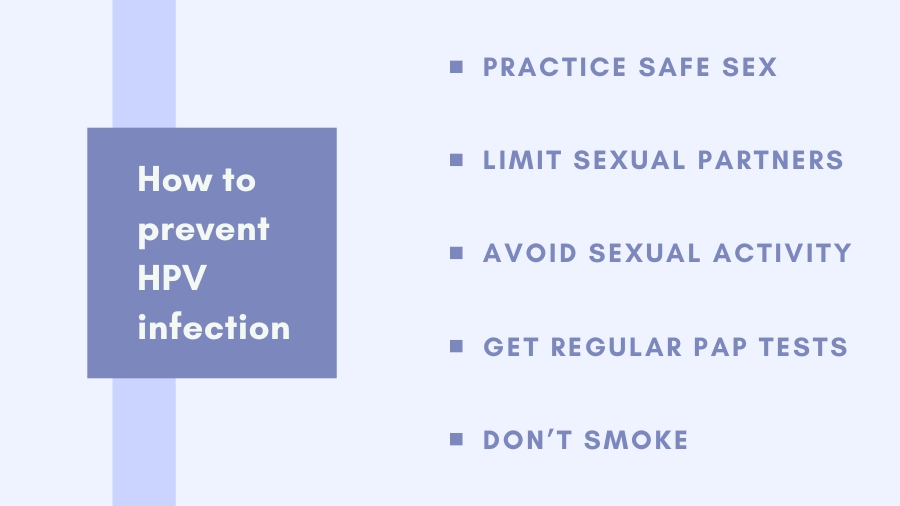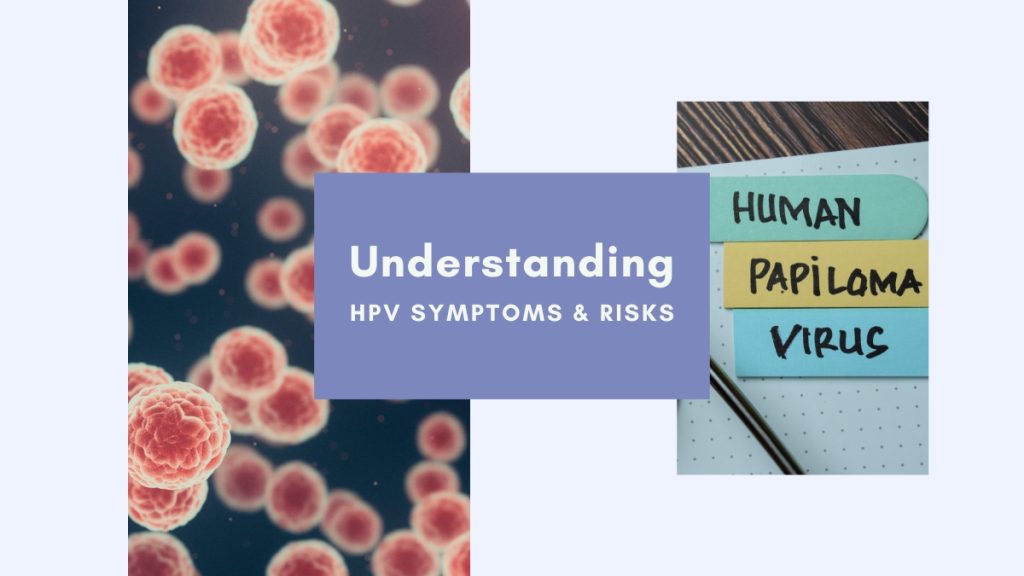Human Papillomavirus (HPV) is a type of virus that is a significant cause of infection in the skin and mucous membranes and it causes diseases in the genital and urinary tracts in both men and women. It is transmitted through direct contact with the virus or through sexual contact. Additionally, people who have HPV Symptoms may not show any which means they can unknowingly spread the virus to others.
HPV Symptoms
Most people infected with HPV do not show any symptoms because the body’s immune system can eliminate the virus before warts develop. However, patients who have warts may have different types of warts depending on the strain of the virus, as follows:
Common warts
Common warts are small, raised bumps caused by HPV on skin, often on hands, fingers, face, and scalp. They have rough texture, can be painful, and spread via direct contact. Though not serious, they can be contagious and spread to other body parts or people.
Flat warts
Flat warts, also known as juvenile warts, are small, smooth, flat-topped, flesh-colored or brownish-red warts that typically appear on the face, neck, hands, wrists, and knees. They are caused by the human papillomavirus (HPV) and are most commonly seen in children and young adults. Unlike common warts, flat warts are not usually painful or itchy and are not raised above the skin. They can sometimes disappear on their own but may require treatment if they become bothersome or cosmetically undesirable.
Plantar warts
Plantar warts are non-cancerous skin growths that appear on the soles of the feet. They are caused by the human papillomavirus (HPV) and can be contracted through direct contact with the virus. Plantar warts can be painful and may cause discomfort when walking or standing. They typically appear as small, rough, or thickened areas of skin with tiny black dots in the center. Treatment options for plantar warts include over-the-counter medications, cryotherapy, and laser treatment.
Genital warts
Genital warts are growths caused by HPV, a sexually transmitted infection (STI). They can occur in the genital area or mouth/throat after oral sex with an infected partner. They may vary in size, shape, and color, and can be painless or cause discomfort. Genital warts can be prevented with vaccines and safe sex practices. HPV in the genital area is linked to cervical cancer, so regular screening is important for early detection and treatment.

Risk factors that can lead to HPV infection
- Smoking cigarettes
- Having multiple sexual partners
- Having sexual intercourse at a young age
- Getting pregnant at a young age
- Having many children
Diagnosis of HPV infection
If the patient has visible sores or lesions on the skin, the doctor can diagnose immediately by examining the abnormal skin area. However, in cases where there are no visible sores or cannot be seen with the naked eye, the doctor may use other diagnostic methods such as:
HPV Pap test
The HPV pap test is a screening test used to detect the presence of human papillomavirus (HPV) in the cervix, which can increase the risk of cervical cancer. The test involves collecting a small sample of cells from the cervix during a pelvic exam, which are then examined under a microscope to check for abnormal cells or the presence of HPV. This test is often done as part of a regular gynecological exam for women aged 21 years and older, and can help detect cervical cancer or precancerous changes early, when they are most treatable.
HPV DNA Test
The HPV DNA test checks for the presence of human papillomavirus (HPV) in a woman’s cervix, detecting the most common types that cause cervical cancer. Unlike Pap smears, which detect abnormal cervical cells, the HPV DNA test can identify early-stage HPV infections. Women aged 30 or older or with abnormal Pap smear results are recommended to take this test. It can also help identify those at higher risk of cervical cancer and in need of further testing or treatment.
HPV Colposcopy
HPV colposcopy is a medical procedure that involves examining the cervix, vagina, and vulva using a specialized instrument called a colposcope. This procedure is typically recommended for women who have abnormal Pap smear results, as well as those who have tested positive for HPV.
During the colposcopy procedure, a healthcare provider will use a colposcope to magnify and illuminate the tissues of the cervix, vagina, and vulva. They will look for any abnormal areas, such as areas of abnormal cell growth or precancerous lesions, that may be caused by HPV infection. If any abnormal areas are found, the healthcare provider may take a biopsy (a small tissue sample) for further testing.
A colposcopy procedure usually takes between 15-30 minutes, and can be performed in a healthcare provider’s office or clinic. It is generally a safe and well-tolerated procedure, although some women may experience mild discomfort or cramping during the procedure. After a colposcopy, most women can resume their normal activities, although they may need to avoid sex and using tampons for a few days.
Acetic Acid Solution Test
The HPV acetic acid solution test, also known as the vinegar test, is a diagnostic procedure used to detect abnormal cells on the cervix caused by human papillomavirus (HPV) infection. During the test, a healthcare provider applies a solution of acetic acid (a weak vinegar solution) to the cervix, which makes abnormal cells turn white and visible. The test is often done in conjunction with a colposcopy, in which a magnifying instrument is used to examine the cervix more closely.
The HPV acetic acid solution test is a quick and simple procedure that can be done in a healthcare provider’s office. It is recommended for women who have had an abnormal Pap test or who have other risk factors for cervical cancer, such as a history of HPV infection. The test can help detect abnormal cells early, before they turn into cancer, and can be an important part of regular cervical cancer screening for women.
Treatment of HPV infection
Currently, there is no specific cure for HPV infection, as the body’s immune system gradually eliminates the virus. However, treatment for the abnormalities caused by infection, such as cancer or warts, may vary depending on the symptoms. Patients with cancer may require surgery or radiation therapy, and early detection and treatment can improve the effectiveness of treatment. For patients with warts, physicians often recommend the following medications:
- Salicylic acid is a topical medication used to treat common warts. It works by gradually peeling off the layers of skin on the affected area. However, it may cause skin irritation and should not be used on the face.
- Podofilox is a medication that destroys the tissue of warts and is commonly used on genital warts. It may cause pain and itching on the treated area.
- Imiquimod stimulates the immune system to eliminate HPV and can cause redness and swelling on the treated area.
- Trichloroacetic acid is commonly used to remove warts on the hands, feet, or genitals, and may cause skin irritation.
If medication is ineffective in treating warts, the physician may recommend other treatments such as surgery, laser treatment, cryotherapy, or electrocautery. However, treating warts with medication or other methods does not guarantee complete elimination of the virus.
Read more about STIs.

How to prevent HPV infection
The most effective way to prevent HPV infection is to get vaccinated with the HPV vaccine. The HPV vaccine is recommended for both males and females, and it is most effective when given before the individual becomes sexually active.
Other ways to prevent HPV infection include:
- Practice safe sex consistently using condoms during sexual activity can help reduce the risk of HPV transmission but it is not 100% effective.
- Limit sexual partners the more sexual partners a person has, the higher the risk of HPV transmission.
- Avoid sexual activity with partners who have genital warts or other symptoms of HPV infection.
- Get regular Pap tests: Regular cervical cancer screenings can help detect abnormal cells caused by HPV early on, which can help prevent the development of cervical cancer.
- Don’t smoke smoking weakens the immune system, making it more difficult to fight off HPV infection.
It is important to note that HPV symptoms is very common, and most sexually active individuals will contract the virus at some point in their lives. However, practicing safe sex and getting vaccinated can greatly reduce the risk of developing HPV-related health problems.

